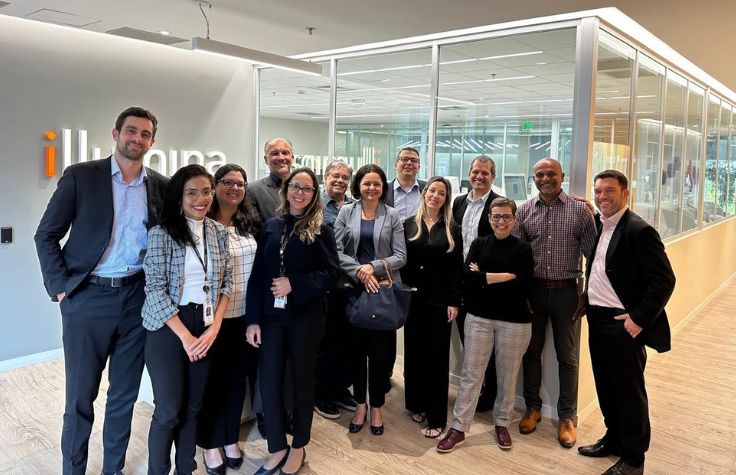
2024년 5월 23일
Brazil is the largest and most populous country in South America, with 220 million people. According to the World Cancer Research Fund International, the cancer rate for Brazilians in 2020 was about 204 cases per 100,000 people, slightly above the global rate of 190, but well below the highest (Denmark, at 335).
Brazilians have a national health care system, with the option to pay for private care. In general, cancer patients are often diagnosed very late and those who have the financial resources tend to choose private hospitals for standard treatment.
The use of genetic testing has been very limited in Brazil. While public hospitals offer genetic testing in a few areas, such as for intellectual disabilities, testing is practically nonexistent for cancer. Five states have implemented laws requiring providers to reimburse for hereditary breast cancer; although adoption has been slow, Illumina is working with pharma partners to establish genome sequencing hubs in those states.
Last year, one private payer began covering comprehensive genomic profiling (CGP), a next-generation sequencing approach that uses a single assay to assess hundreds of genes including relevant cancer biomarkers for therapy guidance. “This was a landmark victory in terms of advancing precision oncology in Brazil,” says Staff Medical Science Liaison Livia Loureiro, PhD.
Loureiro lives in the state of Santa Catarina. She completed her PhD and postdoctoral studies in genetics at the Hospital for Sick Children/University of Toronto in Canada before returning to Brazil, where she now works closely with Illumina’s market access and patient advocacy teams as part of the company’s medical affairs organization for Latin America. It was through the efforts of these teams that the aforementioned payer made its coverage decision; Illumina also works with other payers and the Ministry of Health. However, the most compelling tool they still lack is evidence that CGP works for Brazilians. “We have a very unique population,” she says. “Very few have been tested.”
Most studies come from the US or are based on a European population, so they don’t have specific information about cancer in the Brazilian population, Loureiro explains: “We have a few studies using single-gene and small panels, but we are starting to explore more, starting to work with CGP. We’re trying to understand the characterizations of the genetics in the cancer population in Brazil which we did not have before.” Specific studies, she emphasizes, “are really important, not only for information, but for reimbursement itself.”
One such study was recently accepted as an online publication at the 2024 American Society of Clinical Oncology (ASCO) annual meeting. In this study, “Implementation of a comprehensive genomic profiling panel for precision oncology,” Loureiro was a coauthor who collaborated with A.C. Camargo Cancer Center in São Paulo. A.C. Camargo is a large public-private cancer center with a network of one public hospital and five private hospitals.
The researchers performed CGP on 40 positive tissue samples (16 of which also had homologous recombination deficiency, or HRD) from various tumor types: triple-negative breast cancer and lung cancer were the most common, followed by endometrial cancer, colorectal cancer, and sarcoma.
For the study, researchers used the Illumina TruSight Oncology 500 and TruSight Oncology 500 HRD assays to detect small variants, copy number alterations, microsatellite instability, tumor mutational burden, and genomic instability score in DNA samples; as well as gene fusions and splice variants in RNA samples with the NextSeq 500 System. The team also used Illumina Connected Analytics for secondary analysis and Illumina Connected Insights and other platforms for tertiary analysis.
The 16 samples tested for HRD showed the most surprising results. “HRD is a very important genomic signature to know if the patient will respond to PARP inhibitors and platinum-based chemotherapy,” Loureiro says. “And for the breast cancer patients, eight out of 11 had high HRD, which is a really big number.” Six of those eight had either BRCA1 germline mutation and BRCA1 or RAD51C somatic promoter methylation. “The combination of those two genes increased the HRD, and that’s new to the Brazilian population. We were really excited to have this result for our population. And that will make a lot of difference for cancer patients, since it can be a potential biomarker for selecting metastatic triple-negative breast cancer patients for PARP inhibitor therapies. And again, those population-based results will be really important for the payers. There are already studies elsewhere that show this kind of test will decrease hospitalization time, chemotherapy, and other healthcare costs, but they don’t know our cost, and how those genomic signatures work in our population.”
Addressing the gaps
“I do have high hopes for oncology in Brazil,” Loureiro says. In 2023, an advisory board of experts across the country mapped out the health care gaps in oncology. Two large gaps they identified were tissue handling early in the diagnostic process and interpreting reports at the end of testing. Illumina and stakeholders are addressing these gaps with focused projects. For example, Illumina is coordinating workshops and in-person events for interpretation and tissue handling, detailing how surgeons should collect specimens and deliver them to the lab. Illumina is also partnering with pharma companies, Brazilian societies, and other entities to invite medical professionals from different regions of the country to learn the A to Z of genomic testing in person.
“We are really trying to work on improving those two ends, because more than reimbursement, we need to educate physicians,” says Loureiro. “Most doctors outside major city centers don’t know what genetic testing is. If oncologists do, they don’t know the importance of CGP. They order single-gene tests.”
In addition to educating health care professionals directly, Illumina is also working to form and implement nationwide initiatives so doctors can have more confidence and support in ordering tests and interpreting results.
Loureiro says that many medical experts in Brazil believe CGP will be reimbursed in the next five to 10 years, and that precision oncology will one day be fully realized in every community health system.


